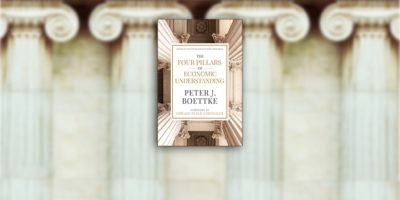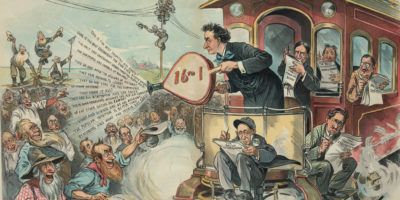
“We need not indulge the bombastic posturing of Trump, or unlikely legislative efforts to strip funding from schools, to conclude that the 1619 Project is still ill-suited for K-12 education. That is a judgement we may make on its scholarly shortcomings alone.” ~ Phillip W. Magness
READ MORE
“When we see the potential of freely interacting individuals, economic understanding becomes necessarily built on hope. Hope about innovation, mutual agreement, peace, and prosperity. When people are left to their own devices and the rulers of society are held accountable, this is what results.” ~ Ethan Yang
READ MORE
“The New History of Capitalism misfires badly, however, in its interpretation of these facts. Slavery was not necessary for cotton, and cotton was not necessary for industrialization. Had chattel slavery never taken hold in the United States, we would very likely be richer than we are today.” ~ Art Carden
READ MORE
“AIER is convincing the world that lockdowns were poor policies indeed, never to be repeated for this or any similar threat.” ~ Robert Wright
READ MORE
“Treating this as a mistake and correcting it is the right thing to do in response to an unfortunate lapse in judgement. Failure to do so in my opinion would amount to among the most egregious instances of such crass intimidation I have seen.” ~ Max Gulker
READ MORE
“Now, at the age of 90, Thomas Sowell continues to offer us understanding and insight into the attitudes and institutions that can bring all people greater peace and prosperity, as well as human liberty.” ~ Richard Ebeling
READ MORE
“In order to understand ‘racism and its impact on our profession and our discipline,’ that discussion needs to look inward though at the organization’s own history. Doing so will require a frank, factual, and historically grounded evaluation of the ongoing legacies of formative AEA leaders such as Ely, Commons, and Ross.” ~ Phil Magness
READ MORE
“There is ample evidence that decriminalization of Americans’ personal lives, the proliferation of gun ownership, and the encouragement of competitive markets for property insurance and private protection services can greatly improve upon our current monopolistic, union-controlled, taxpayer-funded machines of state repression.” ~ Robert E. Wright
READ MORE
“Your cause is just and we hope we can work together in the days, weeks, months, and years ahead.” ~ Robert E. Wright
READ MORE
“The U.S. and Japan are old welfare states that can’t afford what they’re doing; nonetheless, their politicians can’t seem to succeed electorally without persisting in their profligacy. Japan’s history signals the likely outcome for copycats: prolonged stagnation.” Richard M. Salsman
READ MORE
“Populist beneficence — using funds taken from the populace via taxation and/or inflation — is a favorite tactic of authoritarian and “banana republic” governments the world over.” ~ Raymond Niles
READ MORE
“How a casual reference to a common and widespread conceptual tool from economics can be contorted into a conspiratorial design for malice by persons who present themselves as intellectual elites but lack familiarity with the subjects of their frenzied imaginations.” ~ Phil Magness
READ MORE250 Division Street | PO Box 1000
Great Barrington, MA 01230-1000
Press and other media outlets contact
888-528-1216
press@aier.org
This work is licensed under a
Creative Commons Attribution 4.0 International License,
except where copyright is otherwise reserved.
© 2021 American Institute for Economic Research
Privacy Policy
AIER is a 501(c)(3) Nonprofit
registered in the US under EIN: 04-2121305